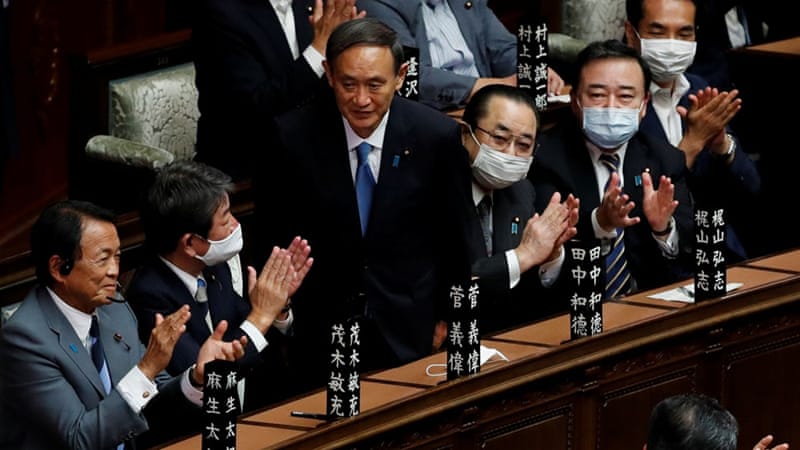
- ARAB NEWS
- 09 Jul 2025

Japan’s new Prime Minister SUGA Yoshihide inherits from his predecessor Abe Shinzo a country facing numerous challenges, including the coronavirus disease (COVID-19), economic performance, social issues, and security concerns. Suga is well prepared for this challenging landscape.
The 71-year-old, a long-time Abe loyalist, is now prime minister after a landslide victory in this week’s ruling Liberal Democratic Party (LDP) leadership election.
The result had been almost predetermined because of Suga’s popularity and political acumen. The LDP controls the lower house of Japan’s parliament and so its president becomes the new prime minister.
Suga is the longest-serving chief Cabinet secretary in Japanese history. This is a crucial position as the chief Cabinet secretary actually rules the country in terms of management. The secretary coordinates policy across government ministries, is the conduit between the prime minister and his political party, and deals with crisis management. Some called Suga “the shadow prime minister” because of the political power he built up over the years behind Abe. He pledged to carry on many of the former prime minister’s programs, including his signature “Abenomics” economic strategy. Suga is a powerful Japanese prime minister who is likely to show a more assertive face in the region and around the world.
The US is happy with Suga as PM because it will be able to develop the bilateral security relationship in new ways. Continuity in Japan’s foreign policy is apparently reassuring to the White House. Because of COVID-19, as well as the Trump administration trying to get Tokyo to pay more for its defense burden, Japan is increasingly building its own defense in order to be more independent when transactional politics do not meet its requirements.
There is no better example than Japan’s cancelation of its plan to buy the Aegis Ashore missile defense system. With the US and Japan haggling over systems and strategy, the cancelation gives Tokyo the ability to choose from three potential ballistic missile defense plans, encompassing an isolated installed launcher, a huge floating platform or an increase in Aegis destroyers. This move plays to politicians in both Tokyo and Washington. Some argue that Japan’s Aegis-equipped destroyers may become the key platform for the LDP’s proposed “missile interdiction” in foreign territory, as well as for midcourse missile interception. Japan’s indigenous missile-building program, as well as its electronics capabilities, will help increase its military and security weight.
It is important to recall that, in 2015, previous PM Abe pushed ahead with expanding Japan’s role in regional security and international peace-building efforts by loosening the constraints imposed under its postwar constitution via the enactment of new security legislation. The principle of “senshu boei” (exclusively defensive defense) was overturned and Japan now participates in a multitude of exercises and peacekeeping operations. The maritime domain is Japan’s area of operational excellence and is the greatest value addition it offers to the US-Japan alliance. Tokyo’s contribution in regional and international security is only set to grow in the Indo-Pacific theater.
The debate in Japan over the country’s approach toward China is at a critical juncture. Discussions within the LDP about when to reschedule Xi Jinping’s state visit — postponed from April due to COVID-19 — and arguments by some that it should be canceled due to the Chinese national security law in Hong Kong miss the bigger strategic picture.
Suga is a powerful Japanese prime minister who is likely to show a more assertive face in the region and around the world.
Dr. Theodore Karasik
Japanese officials are arguing that there is a need to develop a new joint strategy with the US to navigate the deepening uncertainty surrounding a post-COVID-19 regional order. This should focus on ameliorating the confrontational US-China postures and recommitting the region to shared peace and prosperity. LDP politics are likely to play a role in how this effort will be shaped. The ruling party and other Japanese officials are aware that, if the US is damaged by the fight against COVID-19 and suffers further political fragmentation as a consequence of November’s presidential election, Tokyo is not expecting American leadership or even involvement in reaffirming the alliance and international order. This point of view is prevalent among some Japanese politicians and needs to be taken seriously.
Overall, for Washington, how Suga deals with China, South Korea and North Korea is of major importance. Beijing is increasingly conducting incursions into the Diaoyu/Senkaku Islands and Pyongyang is threatening Japan with ballistic and other missiles. These threats have reignited debate over Japan’s defensive options, including the development of overseas strike capabilities.